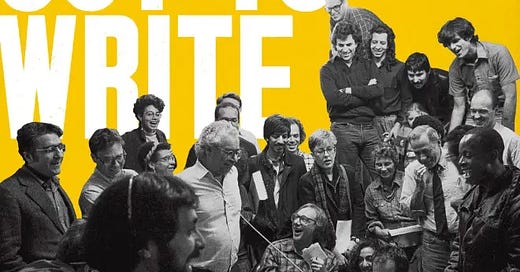The "Voice" That Transformed the Media
Oral history of the revolutionary weekly paper reads like a novel
Words in Print Still Matter
“The Freaks Come Out to Write,” a 500-plus page account of the legendary Village Voice is the “Oppenheimer” of oral histories – a magnificent landmark achievement. And not just because it details an ongoing proverbial nuclear event, more fusion than fission, from the 1950s into the ‘90s.
A pivotal periodical in what was called the “new journalism,” the Voice was also the first-stage launch rocket for the alternative newsweeklies that later blossomed in major and mid-sized cities across the nation. A significant part of my journalism career has been with and for such papers, placing me at core of this book’s primary audience. But I urge anyone interested in the earthshaking shifts in journalism and media since the founding of the weekly paper in 1955 as well as the cultural, social and political headwinds, currents and undertows in the many years that follow to savor this historical and cultural treasure.
Author Tricia Romano, a former Voice editorial staffer, superbly knits the quotes she elicited into a seamlessly engaging narrative tale. And does so with what’s largely short yet pithy chapters hopping from one significant and telling beat in the paper’s vivid saga to the next. The many Romano spoke with that worked and wrote for the Voice along with some from its surrounding community tell almost all you need to know of each of each account. I’m wowed by her finesse.
For a number of my late teen and college years in upstate New York, I’d seek out the Village Voice wherever I could find it, just as a number of the paper’s key players did before they arrived in the city from other locales. Once I was there, it was all but a Manhattan ordinance to get the paper as soon as it hit the stands every Thursday. The Voice was an essential source of information, a symphony of tribal drums beating at the heart of the Manhattan zeitgeist as well as snapshots and reports from the world around it.
One of the first places that I was published in 1976 was the upstart rival to the Voice, the Soho Weekly News. Among those I shared its pages with was Michael Musto, who later became a star at the Voice with his wickedly arch and amusing La Dolce Musto gossip/nightlife column, the asymptote of that form. Within the downtown social demimonde (where I’d cross paths with Musto on the job while I was on the prowl), I came to know such VV notables as the aptly-anointed Dean of Rock Critics, Robert Christgau, whose wise comments in this tome befit such stature, and master wordsmith James Wolcott, among others. My best friend, photographer and writer Stephanie Chernikowski, also contributed indelible images and smart, succinct words to the paper.
Hence reading it summons up and interweaves with my rather wondrous years at the center of known universe as a New Yorker. As the book also does with so much of what’s vital and significant that transpired over the VV’s decades at the core of the cultural and political conversation. There will never be another publication as vital and rich with truly new, inspiring and challenging writing and topics as it was before today’s digital media landscape far lowered the bar.
The Voice was where I first learned about the striving, scams and psychopathic self-aggrandizement of the now (finally!) convicted felon tRump. It was dead center at the Stonewall Riots that sparked gay liberation. It was on the front lines of feminism, fostered Off Broadway theatre and New York Bohemian’s creative explosion from the ‘70s into the ‘80s, and touted hip-hop music from its South Bronx birth. And quite notably, the Voice served as an essential informational nexus when the mysterious AIDS virus began scythe its deadly way through NYC’s gay community, even though, as the book details, AIDS activists loudly denounced the paper for not doing enough.
That’s only some of the paper’s influence that made it a cultural and journalism monument. “The Freaks Come Out to Write” brings alive the people, place and stories of a newspaper and the times it documented as well as being well worth remembering itself.





